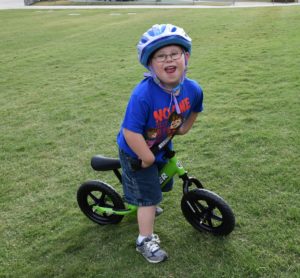Twenty KinderFrogs took part in the first Strider Cup Race held in Texas last month. The race was a part of the national Strider Cup racing series, an event in which kids ages two to five, including children with special needs, put their bicycle skills to the test.
Strider Bikes are specially designed to allow children to focus on the fundamentals of balancing, leaning and steering without the distractions or complications of pedals or training wheels. The bikes allow kids to keep their feet on the ground so they can safely maneuver as they learn to ride, and the seats are positioned lower than traditional bicycles to provide better control.
“Children with Down syndrome often struggle when learning to ride a bicycle,” said Dr. Amanda Young, adapted physical education teacher at KinderFrogs School and Starpoint School. “Physical characteristics associated with Down syndrome, such as low muscle tone, loose ligaments and decreased muscular strength, can significantly influence the development of gross motor skills.
“Research shows that this delay in development can be offset by developing strength and balance through practice-based activities; that’s why I was thrilled to learn about Strider Bikes and the opportunity for our students to use them.”
Young began working at TCU’s laboratory schools as a part-time student teacher during her undergraduate studies at TCU. She transitioned to a full-time position in 2010 while earning both her master’s degree and Ph.D. in adapted physical education at Texas Woman’s University. Her work at KinderFrogs helped her with her dissertation, the Effect of Adapted Physical Education and Homework on Gross Motor Development for Young Children with Down Syndrome, and her students, in turn, receive the benefit.
Adapted physical education is the art and science of developing, implementing and monitoring a carefully designed physical education program for learners with special needs. The program, based on a comprehensive assessment, gives each learner the skills needed to enhance his or her physical fitness and gross motor development.
“As part of my research, I studied the impact of adapted physical education and parent-implemented homework on the motor development of children with Down syndrome to identify the best advancement methods,” said Young.
Each day for 12 weeks, Young compared three groups of children: those participating in adapted physical education, those with APE plus related picture card homework and those with APE plus related instructional online video homework, to measure the movement and coordination of their arms and legs through throwing, catching, kicking and two-handed striking.
Pre- and post-tests, as well as retention scores following the program, demonstrated that all groups made significant progress in object control skills, with no significant variance among groups. Qualitative data from family survey responses, however, supported the use of homework for their children with Down syndrome, and families reported increased developmental progress and improvement in gross motor activities as a result of the homework when combined with defined play time.
“One of the favorite recreational activities families identified was bike riding,” said Young. “For young children with Down syndrome, family recreation not only helps with growth and development, but it also builds cooperation and problem-solving skills while having fun.”
Young said her students quickly adapted to the bicycles as they prepared for the race.
“It was wonderful to watch the kids demonstrate the coordination and balance skills that we’ve been working on through the APE program and achieve a new level of independence when riding the bikes,” said Young. “And because Strider Bikes is donating the bicycles to the students, they can further their progress at home with their families.”
Young will continue to encourage home-based activities and family recreation, including the use of the Strider Bikes, and plans to host a family fitness and recreation night where her students can show off their enhanced bike skills this fall.
Strider Bikes is the world’s leading manufacturer of children’s no-pedal balance bikes and has donated more than $850,000 to organizations that serve children and adults in need.
KinderFrogs School is an early-intervention educational program for children ages 18 months to six years with Down syndrome and other developmental delays.
